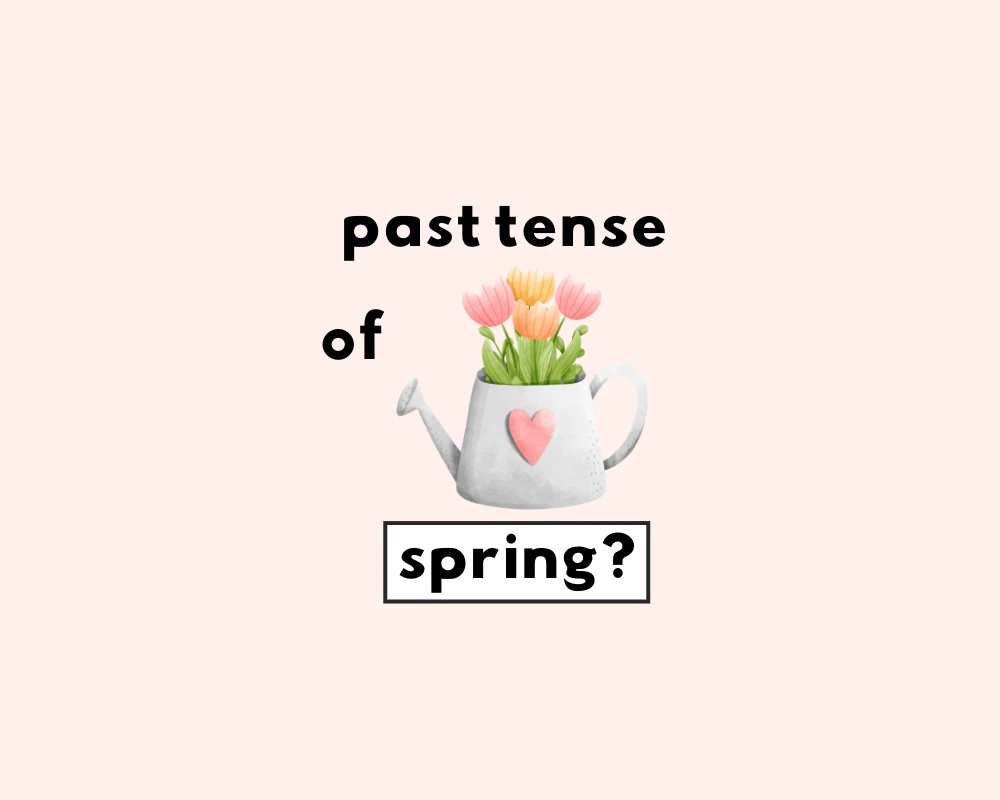
What’s the past tense of “spring”?
The verb spring describes a quick or sudden movement upward or forward, as in “The cat sprang onto the table” or “I sprang out of bed.” To refer to the past tense of spring, we use sprang in the simple past and sprung in the past perfect and past perfect continuous tenses. Each tense depict time and action differently, so make sure to each each conjugation in the appropriate context!
The dog sprang over the fence.
She had sprung into action when she heard the alarm.
The jack-in-the-box sprung open unexpectedly.
The trap has sprang shut.
Forms of the verb spring
Spring is in the present tense: The cat loves to spring onto the sofa.
Springs is the third-person present singular: The river springs from a small mountain stream.
Springing is the present participle form: New flowers are springing up in the garden
Sprang is the simple past tense: He sprang a surprise on me yesterday.
Sprung is the past participle: The coil in the toy had sprung loose, causing it to malfunction.
When to use “sprang” or “sprung”
Past tense: The ball sprang off the wall.
Past participle: The athlete had sprung over the high jump bar with ease.
Sprung is the past tense and past participle of spring when it is used transitively, meaning it takes an object. It is used to describe the act of causing something to suddenly move or be released, such as a trap or a coiled spring. For example:
- The trap was sprung when the mouse went for the bait.
- He sprung a surprise on me with the gift.
It’s worth noting that sprung can also be used as an adjective, describing something that has been released or uncoiled, such as a spring on a door.
Examples of “spring”, present tense in sentences
1. New flowers are springing up in the garden
2. The horse was able to spring over the fence easily.
3. The team is hoping to spring a surprise on their opponents.
4. The trap will spring shut when the mouse takes the bait.
5. I always spring out of bed when my alarm goes off.
To recall the past tense of “spring,” remember: “sprang” is what someone *sang* in the past, while “sprung” is what *has* or *had* sprung.
Examples of “sprang”, past tense in sentences
1. The cat sprang onto the windowsill.
2. I sprang out of bed when I heard the alarm.
3. He sprang a surprise on me yesterday.
4. Yesterday, I sprang out of bed and started my day.
5. The ball sprang off the wall.
Examples of the past participle “sprung” )
1. The trap was sprung when the mouse went for the bait.
2. The trap had already sprung when I got there.
3. The coil in the toy had sprung loose, causing it to malfunction.
4. He had sprung the lock on the door to get inside the house.
5. The athlete had sprung over the high jump bar with ease.
Idioms with spring/sprung
| Phrase | Meaning |
|---|---|
| spring to mind | when something comes to your mind or you remember suddenly |
| to spring a surprise | to reveal a surprise suddenly or unexpectedly |
| spring cleaning | a thorough cleaning of a home or other space, typically done in the spring. |
| spring in your step | to walk with energy and enthusiasm. |
| spring fever | a feeling of restlessness or excitement that typically occurs during the spring season. |
| spring into action | to act quickly and decisively. |
| spring a leak | to have a small opening that allows something to leak out. |
| spring chicken | a term describing someone as young or inexperienced |
| hope springs eternal | meaning people will always hold out hope for something, no matter how unlikely it may seem. |
| springboard | a starting point or launching pad for something; someone/something to share/bounce ideas with. |
Origin of the word spring
From etymology online on spring (v.):
Old English springan “to leap, burst forth, fly up; spread, grow,” from Proto-Germanic *sprengan.
Work Sheet
According to the blog post, what form of ‘spring’ is used for the simple past tense?
Which sentence correctly uses the past participle form of ‘spring’ as described in the post?
The blog post notes that ‘sprung’ can be used as an adjective. Which phrase is an example of this usage?
According to the post, when is ‘sprung’ used as the past tense?
The memory tip in the blog post compares ‘sprang’ to what word?
Yesterday, I out of bed when I heard the alarm.
The athlete had over the high jump bar with ease.
The trap was when the mouse went for the bait.
The toy soldier has apart.
The news a leak earlier today.
Frequently Asked Questions
What is the simple past tense of spring?
+
When do I use ‘sprung’?
+
Can ‘sprung’ be used for the simple past?
+
Is ‘sprang’ ever wrong for the past participle?
+
When is sprung used transitively?
+
Yash, D. "What’s the Past Tense of Spring? Spring, Sprang, Sprung?." Grammarflex, Jun 20, 2025, https://www.grammarflex.com/spring-sprang-sprung-whats-the-past-tense-of-spring/.
Sources
-
1. Harper, Douglas. “Etymology of spring.” Online Etymology Dictionary, https://www.etymonline.com/word/spring. Accessed 7 March, 2023.











